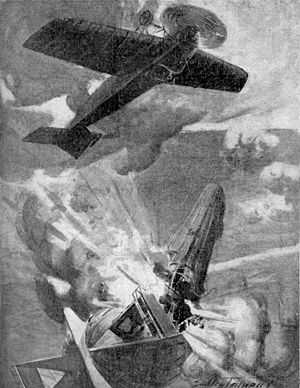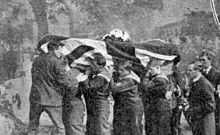Reginald Warneford
| Reginald Alexander John Warneford | |
|---|---|
 R.A.J. Warneford, V.C. standing in front of a Maurice Farman Shorthorn | |
| Born |
15 October 1891 Darjeeling, British India |
| Died |
17 June 1915 (aged 23) Buc, Yvelines, France |
| Buried at | Brompton Cemetery, London |
| Allegiance |
|
| Service/branch |
|
| Years of service | 1914 - 1915 |
| Rank | Sub-Lieutenant |
| Unit | No. 1 Squadron RNAS |
| Battles/wars | World War I |
| Awards |
Victoria Cross Légion d'honneur (France) |
Reginald Alexander John Warneford, VC (15 October 1891 – 17 June 1915) was a Royal Naval Air Service (RNAS) officer who received the Victoria Cross, the highest and most prestigious award for gallantry in the face of the enemy that can be awarded to British and Commonwealth forces.
Early life
Warneford was born in Darjeeling, India, the son of an engineer on the Indian Railways. He was brought to England as a small boy and educated at King Edward VI School, Stratford-upon-Avon[1] but when his family returned to India he continued his education at the English College, Simla. Following apprenticeship in the Merchant Marine, Warneford joined the British-India Steam Navigation Company. At the time of the outbreak of World War I, he was in Canada awaiting return to India. Instead, he sailed then to Great Britain, joining the Army but almost straightaway transferred to the Royal Navy Air Service for pilot training.[2]
Service
Warneford's initial training took place at Hendon, passing then to Upavon where he completed his pilot training on 25 February 1915.[2] During the course of training, the Commander of Naval Air Stations, R M Groves was quoted as saying: "This youngster will either do big things or kill himself."[3] Warneford's flying instructor at the time, Warren Merriam, noted his skills as a pilot but had to make special arrangements to ensure that Warneford's perceived over-confidence did not bar him from attaining a commission. Merriam took an opportunity whilst Commander Groves was visiting Hendon to ask Warneford to demonstrate his flying skills. Groves' favourable impression overcame the views of the Squadron Commander at the time who believed that Warneford would never make an officer because of his lack of discipline.[4]
Warneford was initially posted to 2 Wing on the Isle of Sheppey in Kent but was quickly (7 May 1915) posted to an operational unit with 1 Wing at Veurne on the Belgian coast. Over the next few weeks, Warneford was involved in attacks on German troops and guns, as well as actions against enemy aircraft. His aggressiveness and effectiveness led to his being given his own aircraft and a roving commission.[5] On 17 May 1915, Warneford encountered Zeppelin airship LZ 39 setting out on a raid over the UK. He attacked LZ39 with machine gun fire but the airship was able to ascend out of range by jettisoning ballast.[5]

On 7 June 1915 at Ghent, Belgium, Warneford, flying a Morane-Saulnier Type L, attacked the German airship LZ 37. He chased the airship from the coast near Ostend and, despite its defensive machine-gun fire, succeeded in dropping his bombs on it, the last of which set the airship on fire. LZ37 subsequently crashed in Sint-Amandsberg[6](51°3′43.2″N 3°44′54.7″E / 51.062000°N 3.748528°E).[7] The explosion overturned Warneford's aircraft and stopped its engine. Having no alternative, Warneford had to land behind enemy lines, but after 35 minutes spent on repairs, he managed to restart the engine and returned to base.
On 17 June 1915, Warneford received the award of Légion d'honneur from the French Army Commander in Chief, General Joffre. Following a celebratory lunch, Warneford travelled to the aerodrome at Buc in order to ferry an aircraft for delivery to the RNAS at Veurne. Having made one short test flight, he then flew a second flight, carrying an American journalist, Henry Beach Newman, as passenger. During a climb to 200 feet, the righthand wings collapsed leading to a catastrophic failure of the airframe. Accounts suggest that neither occupant was harnessed and were both thrown out of the aircraft, suffering fatal injuries. In the case of Newman, death was instantaneous.
Warneford died of his injuries on the way to hospital. He was buried at Brompton Cemetery,[8] London on 21 June 1915 in a ceremony attended by thousands of mourners.[9] The grave lies in front of the eastern colonnade.
His Victoria Cross is displayed at the Fleet Air Arm Museum in Yeovil, Somerset, England.

See also
- Leefe Robinson - another VC awarded for shooting down a Zeppelin
Notes
- ↑ http://www.kes-stratford.org.uk/houses/houses.html
- ↑ 2.0 2.1 O'Connor 2005, p. 26.
- ↑ Turner 1972, p. ?
- ↑ Merriam 1954, p. ?
- ↑ 5.0 5.1 O'Connor 2005, p. 27.
- ↑ In remembrance of this event and the pilot, Ghent a street in Ghent was named Reginald Warnefordstreet on the spot where the airship crashed.
- ↑ Historische ontmoeting in Gent (in Dutch), Hangarflying.b
- ↑ CWGC entry
- ↑ O'Connor 2005, p.31
Bibliography
- Buzzell, Nora (1997). The Register of the Victoria Cross (3rd ed.). Cheltenham, Gloucestershire: This England Alma House. ISBN 0-906324-27-0.
- Cooksley, Peter G. (1999). VCs of the First World War: Air VCs. Stroud: Sutton Publishing Ltd. ISBN 0-7509-2272-9.
- Gibson, Mary. Warneford, VC: The First Naval Airmen to Be Awarded the VC. Fleet Air Arm Museum for the Society of Friends of the Fleet Air Arm Museum, 1979 (republished in 1984).
- Harvey, David. Monuments to Courage: Victoria Cross Headstones and Memorials. Vol.1, 1854-1916. Kevin & Kay Patience, 1999.
- Merriam, F. W. First Through the Clouds: The Autobiography of a Box-kite Pioneer. Batsford, 1954.
- O'Connor, Mike (2006). Airfields and Airmen : the Channel Coast. Barnsley: Pen & Sword Military. ISBN 1-84415-258-8.
- Rimell, Raymond Laurence (1989). The airship VC : the life of Captain William Leefe Robinson. Bourne End: Aston Publications Ltd. ISBN 0-946627-53-3.
- Turner, C.C. (1972). The Old Flying Days (Reprint ed.). New York: Arno Press. ISBN 0-405-03783-X.
External links
- Location of grave and VC medal (Brompton Cemetery)
- Reginald Warneford ;findagrave.com
| Wikimedia Commons has media related to Reginald Warneford. |
| ||||||||||||||||||